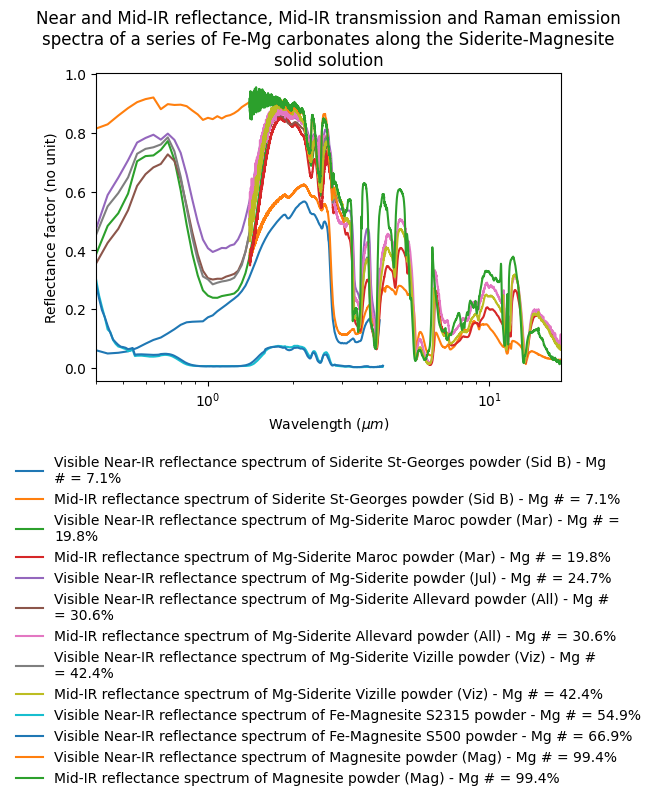- Title
- Near and Mid-IR reflectance, Mid-IR transmission and Raman emission spectra of a series of Fe-Mg carbonates along the Siderite-Magnesite solid solution
- DOI
- 10.26302/SSHADE/EXPERIMENT_BS_20240605_001
- Data reference
- Beck, Pierre; Beyssac, Olivier; Schmitt, Bernard (2023): Near and Mid-IR reflectance, Mid-IR transmission and Raman emission spectra of a series of Fe-Mg carbonates along the Siderite-Magnesite solid solution. SSHADE/DRIMS (OSUG Data Center). Dataset/Spectral Data. https://doi.org/10.26302/SSHADE/EXPERIMENT_BS_20240605_001
- Publications
- Comments
- in press
- Database(s)
- Experimentalists
- Type(s)
- laboratory measurement
- Description
- Near and Mid-IR reflectance of powders, Mid-IR transmission in KBr pellets and Raman emission spectra of grain of a series of 11 Fe-Mg carbonates along the Siderite-Magnesite solid solution (Mg# = 7.1 - 99.4%)
- Number of spectra
- 41
- Variable type(s)
-
- sample composition
- spectrum type
- Comments
- measurement of a series of samples with different techniques and instruments
- Instrument
- SHADOWS Spectro-Gonio bidirectional reflection Vis-NIR
- Sample holder
- cylindric aluminum sample holder, diameter 7 mm, depth 1 mm
- Standard medium
- vacuum
- Observation mode
- spectrum
- Spectral range type(s)
- Vis, NIR
- Valid spectral range(s)
-
Min - Max () Sampling () Resolution () Position accuracy () Absorption edge #1 400.0 - 670.0 10.0 3.2 #2 680.0 - 1590.0 10.0 6.5 #3 1600.0 - 2830.0 10.0 13.0 #4 2840.0 - 4100.0 10.0 26.0
Definition: incidence and emergence angles are positive with origin at nadir, and vary in same direction. Azimuth origin (increasing clockwise) is for i = e (opposition geometry).
- Observation geometry
- bidirectional
- Observation mode
- fixed angles
- Incidence angle
- 0.0°
- Emergence angle
- 30.0°
- Azimuth angle
- 0.0°
- Phase angle
- 30.0°
- Resolution illumination
- 2.9°
- Resolution observation
- 2.05°
Illumination
Observation
- Comments
- partial polarization variable with wavelength (from monochromator grating)
- Observation mode
- single spot
- Spatial resolution
- 5.2
- Instrument
- Brucker Vertex 70 #2 – reflection Mid-IR
- Sample holder
- cylindric aluminum sample holder
- Standard medium
- vacuum
- Observation mode
- spectrum
- Spectral range type(s)
- NIR, MIR
- Valid spectral range(s)
-
Min - Max () Sampling () Resolution () Position accuracy () Absorption edge #1 555.0 - 7000.0 0.48 0.96 0.2 - Comments
- measured between 400 and 8000 cm-1
Definition: incidence and emergence angles are positive with origin at nadir, and vary in same direction. Azimuth origin (increasing clockwise) is for i = e (opposition geometry).
- Observation geometry
- biconical
- Observation mode
- fixed angles
- Incidence angle
- 0.0°
- Emergence angle
- 30.0°
- Observation mode
- single spot
- Spatial resolution
- 1.0
- Instrument
- Brucker Vertex 70v – transmission Mid-IR
- Standard medium
- vacuum
- Observation mode
- spectrum
- Spectral range type(s)
- MIR
- Valid spectral range(s)
-
Min - Max () Sampling () Resolution () Position accuracy () Absorption edge #1 368.0 - 7497.0 1.929 3.85 0.5
Definition: incidence and emergence angles are positive with origin at nadir. Emergence angle in transmission is larger than 90° (=180°-i).
- Observation geometry
- direct
- Observation mode
- fixed angles
- Incidence angle
- 0.0°
- Emergence angle
- 180.0°
- Azimuth angle
- 0.0°
- Phase angle
- 180.0°
- Observation mode
- single spot
- Spatial resolution
- 6.0
- Instrument
- Micro-Raman LabRam HR800 - 532 nm
- Standard medium
- vacuum
- Observation mode
- spectrum
- Spectral range type(s)
- MIR, FIR
- Valid spectral range(s)
-
Min - Max () Sampling () Resolution () Position accuracy () Absorption edge #1 55.0 - 1800.0 0.45 0.9 0.2 - Filters
-
Type Center/Edge () Width () Place #1 532.3 nm edge filter 100.0 - Comments
- Resolution varies from 1.05 cm-1 @ 50 cm-1 to 0.82 cm-1 @ 1800 cm-1. Sampling varies from 0.52 to 0.41 in the 50-1800 range
- Observation geometry
- confocal
- Observation mode
- fixed angles
- Incidence angle
- 0.0°
- Emergence angle
- 0.0°
- Observation mode
- single spot
- Objective type
- x100
- Spatial resolution
- 1.0
- Instrument
- Renishaw InVia Reflex microRaman 532nm
- Standard medium
- vacuum
- Observation mode
- spectrum
- Spectral range type(s)
- MIR
- Valid spectral range(s)
-
Min - Max () Sampling () Resolution () Position accuracy () Absorption edge #1 467.0 - 1664.0 1.2 2.4 0.3 - Filters
-
Type Center/Edge () Width () Place #1 532 nm notch filter - Comments
- Resolution varies from 2.6 cm-1 @ 450 cm-1 to 2.15 cm-1 @ 1650 cm-1. Sampling varies from 1.3 to 1.07 in the 450-1650 $cm^{-1}
- Observation geometry
- confocal
- Observation mode
- fixed angles
- Emergence angle
- 0.0°
- Azimuth angle
- 0.0°
Illumination
Observation
- Comments
- All measurements were performed with a circularly polarized laser using a ¼-wave plate placed before the microscope to minimize polarization effects
- Observation mode
- single spot
- Objective type
- x50
- Spatial resolution
- 1.0
- Date begin
- 2023-04-01
Versions
- Release date
- 2024-07-10 17:01:31+0000 UTC
- Version (Date)
- #1 (2024-07-10 17:01:31+0000 UTC, Updated: 2024-07-10 18:00:48+0000 UTC)
- Sponsors
-
- Centre National d’Etude Spatiale (CNES) (M2020, MSL and MMX support)
